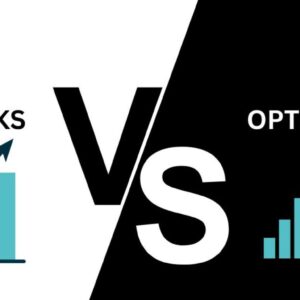Introduction
In the ever-evolving world of finance, there are countless ways to invest your hard-earned cash. Two popular choices for investors are options and stocks. But which one should you choose? In this article, we’ll break down the differences between options and stocks, explore the advantages of option trading, and help you decide if it’s the right path for you.
Understanding Stocks
What are Stocks?
Stocks, also known as equities, represent ownership in a company. When you buy a stock, you’re essentially buying a small piece of that company. As the company grows and becomes more profitable, the value of your stock typically increases.
Pros and Cons of Stock Trading
Stock trading is straightforward and relatively simple to understand, making it a popular choice for beginners. However, it also comes with risks. Stock prices can be volatile, and if the company doesn’t perform well, you could lose money on your investment.
Exploring Options
What are Options?
Options are financial derivatives that give you the right, but not the obligation, to buy or sell an underlying asset at a specified price on or before a certain date. Unlike stocks, options derive their value from an underlying asset, such as a stock or an index.
Types of Options
There are two main types of options: call options and put options. A call option gives the holder the right to buy the underlying asset at a predetermined price, while a put option gives the holder the right to sell the underlying asset at a predetermined price.
Advantages of Option Trading
- Leverage: One of the biggest advantages of options trading is leverage. With options, you can control a large amount of stock with a relatively small amount of capital. This can amplify your gains if the market moves in your favor.
- Limited Risk: Unlike stocks, where your potential losses are unlimited, options trading allows you to know your maximum potential loss upfront. This can help you manage risk more effectively.
- Flexibility: Options offer a wide range of strategies that can be tailored to your specific investment goals and risk tolerance. Whether you’re bullish, bearish, or neutral on a stock, there’s an options strategy for you.
Why Choose Option Trading?
Potential for Higher Returns
Option trading offers the potential for higher returns compared to traditional stock trading. Because of the leverage involved, even a small price movement in the underlying asset can result in significant gains.
Hedging Strategies
Options can also be used as a hedging tool to protect your portfolio against potential losses. For example, if you own a stock that you’re worried about declining in value, you can purchase a put option to hedge against that downside risk.
Diversification
By adding options to your investment portfolio, you can diversify your holdings and reduce your overall risk. Options allow you to gain exposure to different asset classes and market conditions, helping you weather downturns more effectively.
Conclusion
While both options and stocks have their pros and cons, option trading offers unique advantages that make it an attractive choice for many investors. With the potential for higher returns, limited risk, and flexibility, option trading can help you achieve your financial goals more efficiently. However, it’s essential to educate yourself about options and develop a solid trading plan before diving in.
FAQs (Frequently Asked Questions)
1. Are options riskier than stocks? While options trading involves leverage and can amplify gains or losses, it also offers limited risk compared to stocks, where losses can be unlimited.
2. Can I trade options with a small amount of capital? Yes, options trading allows you to control a large amount of stock with a relatively small amount of capital, thanks to leverage.
3. How do I get started with options trading? To get started with options trading, it’s essential to educate yourself about the basics of options, develop a trading plan, and consider practicing with a virtual trading account before risking real money.
4. Are options suitable for beginners? While options trading can be complex, beginners can start with simple strategies and gradually expand their knowledge as they gain experience.
5. What are some common mistakes to avoid in options trading? Some common mistakes to avoid in options trading include not understanding the risks involved, over-leveraging, and not having a solid trading plan in place. It’s essential to educate yourself and approach options trading with caution.


